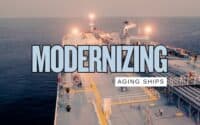Big Improvements to Operational Efficiency in 2024

In the vast and competitive realm of maritime shipping, being efficient isn’t just about saving money—it’s about survival. Operational efficiency helps ship owners maximize their profits, reduce waste, and navigate the complex waters of global trade more smoothly. For a ship owner, improving efficiency can mean the difference between thriving in a tough market and struggling to keep afloat. It impacts everything from fuel consumption and crew scheduling to maintenance and logistics.
* Please send feedback/suggestions to editor @ shipuniverse.com
The Ripple Effect of Recent Global Events
The past few years have been a rollercoaster for industries worldwide, and the maritime sector is no exception. Events like the COVID-19 pandemic, geopolitical tensions, and shifts in global trade agreements have all tossed a few waves at the shipping industry. For example, the Suez Canal blockage in 2021 highlighted the fragility of maritime trade routes and underscored the need for better risk management and contingency planning.
These events have pushed ship owners to rethink and innovate their approach to operations. The pandemic, in particular, accelerated the adoption of digital technologies such as remote monitoring and automated systems, which are now playing a huge role in enhancing operational efficiency.
Staying efficient in this ever-changing landscape is crucial. Not only does it prepare ship owners to handle unexpected challenges more effectively, but it also positions them to take advantage of new opportunities as they arise, ensuring that they remain ahead in the race.
Economic Trends Affecting Maritime Operations
Navigating Through Global Economic Waves
The economic climate has a profound impact on maritime operations, and understanding these trends is crucial for any ship owner. Trade volumes, freight rates, and even fuel prices are directly tied to global economic conditions. As we look toward 2024, it’s important for ship owners to stay informed about these economic indicators to strategically position their operations for success.
For instance, as global economies recover from the effects of the pandemic, we’re seeing an increase in consumer demand which translates into higher shipping volumes. However, geopolitical tensions and trade disputes can quickly alter trade routes and create economic uncertainty. Keeping an eye on these developments will help ship owners adjust their operations swiftly and efficiently.
Fuel Prices and Their Impact on Strategy
Fuel remains one of the largest expenses for any shipping operation. Fluctuations in oil prices can significantly affect operational costs and profitability. In 2024, the push towards more environmentally friendly fuel alternatives is also expected to continue, influencing both costs and regulatory compliance.
For ship owners, optimizing fuel consumption through route planning, speed adjustments, and investing in fuel-efficient technologies is more important than ever. Additionally, exploring alternative fuels such as LNG (Liquefied Natural Gas) or biofuels could not only reduce dependence on traditional oil but also align with upcoming environmental regulations.
Adapting to Economic Predictions for 2024
With the economic landscape of 2024 predicted to remain volatile, proactive planning is essential. Ship owners should consider leveraging advanced analytics to predict trends and adapt their operations accordingly. Implementing flexible business strategies that can handle economic shocks will be a key component in maintaining operational efficiency in uncertain times.
Understanding and adapting to these economic trends will enable ship owners to navigate their ships through turbulent waters, ensuring that they not only survive but thrive in the global maritime industry of 2024.
Technological Advancements in Ship Operations
Embracing the Tech Wave
The maritime industry is experiencing a technological revolution that is transforming every aspect of ship operations. From navigation to communication, and even cargo handling, innovative technologies are making ships smarter and operations smoother. As we move into 2024, the adoption of these advancements is not just beneficial but essential for staying competitive.
Key Technologies Shaping the Future
- Artificial Intelligence (AI) and Machine Learning: These technologies are at the forefront of optimizing routes based on weather conditions and maritime traffic, predicting maintenance issues before they arise, and enhancing cargo management through automated systems. AI-driven analytics can also help ship owners make data-backed decisions, improving overall operational efficiency.
- Internet of Things (IoT): IoT devices on ships allow for real-time monitoring of critical components, from engines to cargo holds. This connectivity ensures that ship owners and managers have up-to-the-minute information on their fleet, enabling quick responses to any operational discrepancies or emergencies.
- Automation and Robotics: Automated processes and robotic assistance are becoming more common on ships for tasks that include cleaning, loading, and unloading cargo, and even inspections. Automation not only increases efficiency but also improves safety by reducing the need for human intervention in potentially hazardous situations.
Moving Forward with Technology
For ship owners heading into 2024, integrating these technologies will be pivotal. The initial investment may be substantial, but the long-term savings and improved operational capabilities will justify the expense. Furthermore, as regulations around emissions and safety tighten, technology will play a crucial role in compliance, making it an indispensable part of maritime operations.
Fuel Efficiency and Alternative Energy Sources
Steering Towards Greener Fuels
As environmental concerns continue to shape policies and consumer expectations, ship owners are under increasing pressure to adopt more sustainable practices. Improving fuel efficiency and exploring alternative energy sources are at the forefront of this shift towards greener maritime operations as we approach 2024.
Strategies for Enhanced Fuel Efficiency
- Optimized Route Planning: Advanced software now enables ships to calculate the most fuel-efficient routes taking into account current weather conditions and maritime traffic. By minimizing unnecessary travel and avoiding harsh conditions, ships can significantly reduce fuel consumption.
- Speed Management: Sometimes referred to as “slow steaming,” reducing ship speed has proven to be a very effective way to decrease fuel usage. The challenge is balancing speed reductions with on-time deliveries, a task that modern analytics can help optimize.
- Hull and Propeller Improvements: Regular cleaning and retrofitting ships with advanced coatings can minimize resistance in water, thereby enhancing fuel efficiency. Similarly, investing in more efficient propeller designs can contribute to significant fuel savings.
The Rise of Alternative Energy Sources
- Liquefied Natural Gas (LNG): As a cleaner alternative to traditional heavy fuel oil, LNG significantly reduces emissions of NOx, SOx, and particulate matter. Its adoption is growing, especially among new ships that are built with LNG capabilities from the start.
- Hybrid and Electric Systems: Inspired by the automotive industry, hybrid and electric propulsion technologies are making their way into maritime vessels, offering reductions in fuel use and emissions for short-sea shipping routes.
- Wind Propulsion Technologies: Supplementing traditional propulsion methods with wind power, such as using sails or kites, has shown potential in reducing fuel consumption. Innovations like rotor sails can harness wind energy to provide additional thrust, decreasing reliance on engines.
The Path Forward with Alternative Fuels
While transitioning to alternative fuels and technologies often involves upfront costs and logistical challenges, the long-term benefits—both environmental and economic—can be substantial. Incentives and regulations in various regions may also support this transition, reducing the financial burden on ship owners.
Balancing Cost and Compliance
In 2024, balancing the cost of new technologies with compliance to stricter environmental regulations will be crucial. Ship owners must stay informed about both emerging technologies and evolving regulations to make strategic decisions that align with their operational goals and environmental responsibilities.
Route and Logistics Optimization
Smart Navigation: The Key to Efficiency
In 2024, optimizing the journey is as critical as managing what happens on board. Advanced route planning can dramatically reduce fuel consumption, save time, and enhance safety by avoiding hazardous weather and geopolitical hotspots.
The Power of Data Analytics in Route Planning
Leveraging big data and predictive analytics, maritime companies can now model and simulate various route scenarios before setting sail. These tools consider historical data, weather forecasts, current maritime traffic, and even political climate to recommend the most efficient routes. This level of planning not only optimizes fuel use but also ensures timely deliveries, which are crucial for maintaining customer satisfaction and profitability.
Integrating Real-Time Data for Dynamic Decision-Making
The use of real-time data feeds into onboard navigation systems allows crews to make adjustments on the fly. For instance, if a new storm pattern develops or if there’s unexpected port congestion, ships can reroute immediately, avoiding delays and reducing the risk of damage.
Enhancing Port Operations
Efficiency on the high seas extends to port operations. Congested or inefficient ports can create significant delays and elevate costs. Thus, improving logistical operations through better scheduling, automation in cargo handling, and faster customs clearance can drastically cut down time spent in port.
Collaborative Efforts for Smoother Transits
Shipping companies are increasingly collaborating with port authorities and other entities involved in the supply chain to streamline operations. This collaboration can lead to shared logistics platforms where data about shipments, port statuses, and even market demand is integrated and analyzed to optimize the entire supply chain.
Future Trends: The Role of AI and Automation
As we move forward, the role of AI and machine learning in predictive analytics will become even more pronounced. These technologies will enable even more precise route planning and real-time decision-making, leading to unprecedented levels of operational efficiency.
Crew Management and Training
Prioritizing Human Capital for Operational Excellence
Efficient management of the crew is essential for operational efficiency in the maritime sector. The crew is not just responsible for the operation of the ship but also for ensuring safety, maintenance, and compliance with international regulations. In 2024, effective crew management and ongoing training are more critical than ever.
Strategies for Effective Crew Management
- Crew Scheduling and Planning: Efficient scheduling helps ensure that the right number of crew members with the appropriate skills are available when needed. This not only complies with maritime labor laws but also prevents fatigue and overwork, which can lead to errors and accidents.
- Digital Tools for Crew Management: Leveraging technology such as crew management software allows for more streamlined operations, from payroll to performance monitoring. These tools help in maintaining a clear record of crew credentials, training schedules, and compliance with maritime labor standards.
The Role of Training in Enhancing Efficiency
- Simulation-Based Training: With advancements in VR (Virtual Reality) and simulation technology, training programs have become more effective and immersive. These tools allow crew members to experience and react to real-world scenarios in a controlled environment, enhancing their skills without the risks associated with on-the-job training.
- Continuous Professional Development: Encouraging ongoing learning and certification not only helps crew members advance their careers but also keeps them updated with the latest operational practices, safety protocols, and technological advancements.
Addressing the Skills Gap
As the maritime industry adopts more sophisticated technologies, a skills gap has emerged. Traditional maritime skills remain essential, yet there’s a growing need for proficiency in new technologies such as digital navigation systems and automated operations. Implementing comprehensive training programs that include upskilling and reskilling can address this gap.
Enhancing Crew Well-being
- Mental Health Support: Recognizing the challenging nature of maritime jobs, providing support for mental health and promoting a work-life balance are crucial for maintaining a motivated and efficient crew.
- Physical Health Programs: Regular health check-ups, on-board exercise routines, and healthy food options help in keeping the crew physically fit and alert.
Looking Ahead: The Future of Crew Management
In 2024 and beyond, integrating technological advancements with human-centric management practices will be key. As the maritime industry continues to evolve, ship owners who invest in their crews’ well-being and professional growth will not only boost operational efficiency but also enhance safety and compliance across their fleets.
Regulatory Compliance and Its Impact on Operations
Navigating the Seas of Regulation
For ship owners, staying compliant with maritime regulations is not just about avoiding fines; it’s a crucial aspect of operational efficiency. As we head into 2024, the regulatory landscape continues to evolve, influenced by increasing environmental concerns, technological advancements, and international agreements. Understanding and integrating these regulations is key to smooth and efficient maritime operations.
Key Regulations to Watch in 2024
- IMO 2020 and Beyond: Initially implemented in 2020, the International Maritime Organization’s (IMO) regulations on sulfur emissions have dramatically influenced ship operations. As these regulations continue to tighten, ship owners must adapt by either retrofitting vessels with sulfur scrubbers or switching to lower-sulfur fuels.
- Ballast Water Management: Regulations aimed at controlling the transfer of potentially invasive species through ballast water discharge are becoming stricter. Compliance requires the installation of approved ballast water treatment systems, a significant operational and financial undertaking.
- Carbon Emissions Policies: With the maritime sector under increasing pressure to reduce carbon footprints, new policies targeting carbon emissions are likely to impact operational practices. This includes potential carbon pricing or mandatory energy efficiency measures.
Compliance Strategies for Efficiency
- Proactive Policy Monitoring and Adoption: Keeping abreast of regulatory changes and planning ahead for compliance can mitigate the risks of operational disruptions and penalties. This proactive approach often involves working with maritime consultants and regulatory bodies.
- Investment in Green Technologies: To meet environmental regulations, investing in cleaner technologies is becoming a necessity. This includes not only emissions-related equipment but also energy-efficient designs and alternative fuels that comply with future standards.
Leveraging Compliance for Competitive Advantage
- Certifications and Eco-Labels: Vessels that achieve certifications for environmental compliance or exceed standards can leverage these credentials for a competitive advantage, appealing to eco-conscious clients and partners.
- Operational Adaptations: While adapting operations to meet new regulations can be challenging, it also presents an opportunity to streamline processes and introduce efficiencies that might not have been previously considered.
Maintenance Strategies for Maximizing Uptime
Keeping the Fleet Afloat: The Role of Maintenance
Effective maintenance is crucial for ensuring that maritime vessels operate reliably and efficiently. As we enter 2024, the complexity of ship systems and the need for compliance with environmental regulations make maintenance strategies more important than ever for ship owners.
Preventive vs. Predictive Maintenance
- Preventive Maintenance: This traditional approach involves regularly scheduled checks and the replacement of parts before they fail. It’s based on manufacturer recommendations and historical data but can sometimes lead to unnecessary maintenance or missed issues.
- Predictive Maintenance: Leveraging advanced sensors and data analytics, predictive maintenance allows ship owners to perform maintenance only when necessary. By monitoring equipment in real-time, predictive maintenance can forecast potential failures before they occur, thus preventing downtime and saving costs.
Integrating New Technologies into Maintenance Plans
- IoT and Big Data: Internet of Things (IoT) devices collect vast amounts of data from ship operations, which can be analyzed to optimize maintenance schedules and procedures. This data-driven approach not only enhances the efficiency of maintenance activities but also extends the lifespan of critical components.
- Robotics and Drones: For external inspections, especially in hard-to-reach areas like the underbelly of a ship or the top of large cargo vessels, drones and robotic devices offer a safe and efficient solution. These technologies reduce the need for human divers or riggers, thereby decreasing risk and improving the thoroughness of inspections.
Sustainable Maintenance Practices
- Eco-friendly Materials and Techniques: In response to environmental regulations, many ship owners are turning to greener maintenance practices, such as using non-toxic anti-fouling paints and recycling parts when possible.
- Energy-Efficient Retrofits: Updating older ships with energy-efficient systems not only helps in meeting compliance standards but also reduces operational costs. For instance, retrofitting older lighting systems with LED technology can significantly decrease energy consumption onboard.
Training and Skill Development
As maintenance techniques become more technologically advanced, training for crew members and maintenance personnel must keep pace. Ensuring that staff are skilled in the latest maintenance technologies and practices is essential for the effectiveness of these strategies.
The Role of Cybersecurity in Operational Efficiency
Safeguarding the High Seas: Cybersecurity Essentials
As maritime operations grow increasingly digital, the importance of robust cybersecurity measures cannot be overstated. For ship owners in 2024, protecting digital infrastructure is as crucial as maintaining physical assets. Cyber threats can disrupt navigation systems, compromise safety, and lead to significant financial losses.
Understanding the Cyber Threat Landscape
- Vulnerabilities in Connectivity: Ships today are equipped with various connected systems for navigation, cargo handling, and communication. Each point of connectivity presents a potential entry for cyberattacks.
- Types of Threats: Common threats include phishing attacks targeting crew members, ransomware that can lock down critical systems, and breaches intended to steal corporate data or manipulate cargo manifests.
Implementing Strong Cybersecurity Measures
- Regular System Audits and Updates: Continuous monitoring and updating of cybersecurity measures are essential to defend against evolving threats. Regular audits help identify vulnerabilities before they can be exploited.
- Crew Training on Cyber Hygiene: Educating the crew about potential cyber threats and proper online behaviors is critical. Simple actions like avoiding suspicious emails or using secure networks can prevent major security breaches.
Leveraging Technology for Enhanced Security
- Advanced Encryption Techniques: Encrypting data transmissions between ships and shore facilities ensures that sensitive information remains secure, even if intercepted.
- Intrusion Detection Systems (IDS): IDS can monitor network traffic for suspicious activity and provide real-time alerts, allowing IT teams to respond quickly to potential threats.
Creating a Culture of Cybersecurity Awareness
- Continuous Education and Simulations: Regular workshops and simulated cyber-attack drills keep cybersecurity at the forefront of crew members’ minds, helping to instill a culture of vigilance.
- Partnerships with Cybersecurity Experts: Collaborating with cybersecurity firms can provide ship owners with expert insights and solutions tailored to the maritime industry.
The Future of Cybersecurity in Maritime Operations
As technology advances, so too will the sophistication of cyber threats. Ship owners must remain proactive in their cybersecurity efforts, continually adapting to protect their operations from digital dangers. Investing in cybersecurity not only preserves operational integrity but also builds trust with clients and stakeholders concerned about the safety and reliability of maritime transport.
Future Outlook and Strategic Planning
Preparing for Tomorrow: The Strategic Importance of Forward Thinking
As we look towards the future beyond 2024, it is clear that the maritime industry is poised for significant changes driven by technological innovation, environmental concerns, and evolving global trade dynamics. Ship owners must engage in strategic planning today to navigate these changes successfully and sustain their competitive edge in the coming years.
Key Trends to Watch
- Continued Technological Disruption: Automation, AI, and IoT will continue to reshape the maritime industry, offering new opportunities for operational efficiency and challenges in integration and cybersecurity.
- Environmental Sustainability: As global attention on environmental impact intensifies, ship owners will need to further invest in sustainable practices and technologies. This includes everything from emissions control to waste management and beyond.
- Global Trade Fluctuations: Changes in global trade agreements, economic sanctions, and regional conflicts could significantly alter trade routes and cargo volumes. Staying adaptable and informed will be crucial.
Long-Term Strategic Planning
- Investment in Research and Development: Continual investment in R&D will be essential for keeping up with technological advancements and developing new solutions to meet environmental and operational challenges.
- Building Flexibility into Operations: Creating adaptable business models that can quickly respond to market changes and regulatory adjustments will help ensure resilience and sustained growth.
- Enhancing Collaborations: Strengthening partnerships with technology providers, regulatory bodies, and other stakeholders in the maritime ecosystem will be key to navigating future challenges.
Leveraging Data for Strategic Insights
- Predictive Analytics: Advanced data analytics will become increasingly important for strategic decision-making, offering insights that can help optimize everything from fleet deployment to fuel consumption.
- Real-Time Data Utilization: Utilizing real-time data for on-the-spot decision-making can dramatically improve responsiveness to operational challenges and market opportunities.
Embracing a Future-Ready Mindset
As ship owners plan for the future, embracing a mindset that is open to change and innovation will be essential. This involves not just adapting to new technologies and practices, but actively shaping them to fit their strategic vision.
Conclusion: The Road Ahead
The maritime industry of 2024 and beyond offers both unprecedented challenges and exciting opportunities. By focusing on strategic planning, embracing technological advancements, and committing to sustainability, ship owners can ensure their fleets not only survive but thrive in the evolving global landscape. Engaging in continuous learning and adaptation will be the keys to success, enabling ship owners to steer their companies into a prosperous future.
Additional References
- International Maritime Organization (IMO): As the United Nations agency responsible for the safety and security of shipping and the prevention of marine and atmospheric pollution by ships, the IMO is a cornerstone for international maritime regulations.
- Maritime and Port Authority of Singapore (MPA): This authority oversees everything from shipping regulations to maritime innovation in one of the world’s busiest ports, making it a key resource for industry standards and new initiatives.
- The Maritime Executive: An industry journal providing in-depth analyses, news, and features covering all aspects of the maritime industry, from commercial to environmental topics.
- SMM Hamburg: Known as a leading international maritime trade fair, SMM Hamburg offers insights into maritime innovations, technology, and industry trends through its extensive exhibition and conference program.
- Massachusetts Institute of Technology Sea Grant Program: Part of the National Sea Grant, MIT’s program focuses on innovative research, education, and outreach related to ocean, coastal, and Great Lakes resources.

Do you have a Maritime Product or Service that may be of interest to Shipowners? Tell us about it here!
Do you have feedback or insights? Please reach out to editor @ shipuniverse.com



